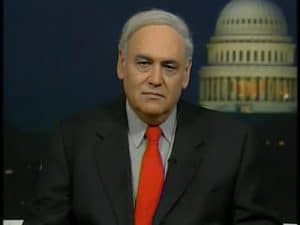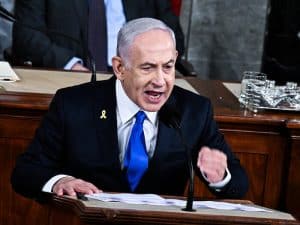PNN – “Richard Pearl”, the former assistant secretary of defense of the United States, who headed a study group, was obliged to prepare a future-research report on the order of Benjamin Netanyahu, the then prime minister of the Israel. This plan later became known as the “Complete Separation” report.
The issue of territorial expansion of “Israel”, known as the “Greater Israel” plan, is directly related to what the Americans put forward under the title of “New Middle East” plan in the 90s. Undoubtedly, developments in the Middle East during the past few decades can be interpreted and analyzed according to these designs. Due to the increasing importance of this issue, in the coming days this case, which was previously published, will be republished in the form of several separate articles.
The first part of this series titled “A plan for the Middle East; Israeli analyst: Our borders will expand from Lebanon to Saudi Arabia” has been published and the second part continues by examining the change in the traditional process of peace with the Palestinians and military action against Iran and Iraq.
The “Carnegie Foundation” think tank is one of the main designers of the “New Middle East” project, which in 2008, in a 48-page report, examined this issue in detail and presented its suggestions. The introduction of this report states: After September 11, 2001, the Bush administration began an ambitious policy to create a new Middle East by intervening in Iraq as the beginning of a transformation in the region. Bush Jr. announced on November 7, 2003: The establishment of a free Iraq in the heart of the Middle East will be an important event in the global democratic revolution. In numerous speeches, Bush administration officials have made it clear that they will not pursue a policy to manage and contain existing crises, but instead intend to create a new region. This idea was put forward more clearly in a statement by Secretary of State Condoleezza Rice during the war between Lebanon and Israel in the summer of 2006. He argued that pressuring Israel to accept a cease-fire would not help peace in the region, since the cease-fire could easily be violated again. The new Middle East should be a region of mostly democratic countries allied with the United States, and regimes that did not cooperate should be subject to a combination of sanctions and support for democratic movements in their country, such as the 2005 Sadr revolution in Lebanon that forced Syrian forces out of the country.
But the story goes back to the years before the formation of the Israeli regime. Where “Theodor Herzl” in his memoirs implicitly mentioned the creation of extensive changes in the West Asian region, he raised the issue of Israel’s territorial expansion from the Nile to the Euphrates. Many other Jewish thinkers such as “Odid Yenon” raise the issue of making changes in the geographical borders of the region in the 80s. But in the 90s, a new plan called “Complete Separation; A new strategy for securing the territory was proposed, known as the Total Separation Report, a policy document prepared in 1996 by a study group headed by Richard Pearl for then-Israeli Prime Minister Benjamin Netanyahu.

The full disengagement report was written by the New Israel Strategy 2000 study group, which was part of the Institute for Advanced Policy and Strategic Studies. Former US Assistant Secretary of Defense Richard Pearl chaired the study group, but the final report included ideas from several people, including Robert Lowenberg, head of the Israeli think tank the Institute for Advanced Policy and Strategic Studies.
The report advocates a reversal of the traditional peace process with the Palestinians and instead emphasizes military action against perceived threats from neighboring countries, especially Iraq and Iran, and calls for Israel to work to weaken Iraq as part of a broader strategy to change regional dynamics. The idea is that the removal of hostile regimes can create opportunities for more favorable relations with other countries.
While the report suggests reducing reliance on some existing diplomatic strategies, such as negotiations based on land concessions, it does not suggest abandoning US support entirely. Instead, it aims to further align US and Israeli interests regarding regional security issues.
The report also points to strengthening Israel’s ties with other allies in the region, especially those with common interests against Iran or groups opposed to Israel, rather than relying on diplomacy or negotiations with adversaries.
In short, while the full disengagement report indicates an intention to move away from some established policies in the peace processes and approaches towards the Arab countries, it basically maintains the expectation of a continued strategic partnership between Israel and the United States in line with the common goals of regional stability and security.

The content of the report is arranged in an introduction and six sections. While there are those who recommend continuing the current process, Israel has the opportunity to create a complete separation, the report said. Israel can build a peace process and strategy based on a completely new intellectual foundation, one that revives strategic initiatives and provides the necessary space for the Jewish people to use every possibility to rebuild Zionism, the starting point of which must be economic reform.
The introduction to this report specifically proposes three new policies:
- Instead of pursuing “comprehensive peace” with the entire Arab world, Israel should jointly work with Jordan and Turkey to limit, destabilize, and withdraw institutions and countries that pose a threat to all three countries.
- Changing the nature of relations with the Palestinians, especially considering the right to pursue and arrest them anywhere in the Palestinian territory, as well as trying to choose an alternative to Arafat.
- Changing relations with the United States with an emphasis on self-reliance and strategic cooperation.
This can only be achieved if Israel takes serious steps to end receiving foreign aid that prevents economic reforms.
A new approach to peace
While the previous Israeli government and many outside it may emphasize a land for peace that left Israel in a cultural, economic, political, diplomatic, and military retreat, the new government could promote Western values and traditions. Such an approach, which would be well received in the United States, would include “peace for peace’s sake,” “peace through strength and self-reliance, and addressing the balance of power approach.”
Moving towards a traditional balance of power strategy
Israel can shape its strategic environment with the cooperation of Türkiye and Jordan by weakening, restraining and even withdrawing Syria. This effort could be focused on Israel’s important strategic goal of removing Saddam Hussein from power in Iraq and serve as a tool to thwart Syria’s regional ambitions.
Since the future of Iraq could profoundly affect the strategic balance in the Middle East, it is understandable that Israel has an interest in supporting the Jordanian Hashemites and their efforts to change power in Iraq, such as: visiting Jordan as the first official state visit even before Netanyahu’s new government’s visit to the United States; Supporting King Hussein by providing some concrete security measures to protect his rule from Syria. Investing in Jordan through infiltrating the US business community to restructure Jordan’s economy away from dependence on Iraq and divert Syria’s attention by using Lebanese opposition elements to destabilize Syrian control over Lebanon.

Changing the nature of relations with the Palestinians
Israel has the chance to create new relations between itself and the Palestinians. First and foremost, Israel’s efforts to secure its land require the development of a strategy to pursue and arrest people in the Palestinian-controlled areas, a justifiable practice that the Americans can go along with, to emphasize that Israel considers the actions of the Palestinian Liberation Movement problematic, but not the Arab people. Israel may want to make a special effort to reward friends and promote human rights among Arabs.
Creating a new relationship between America and Israel
Israel can move away from the past approach and create a new vision for partnership with the US based on self-reliance, maturity and mutual cooperation, rather than focusing on territorial disputes. Based on the philosophy of peace through strength, Israel’s new strategy reflects the continuity of Western values by emphasizing that Israel is self-reliant, does not need American forces to defend it, including in the Golan Heights, and can manage it.
To reinforce this, the Israeli prime minister could use his upcoming trip to announce that Israel is now mature enough to immediately free itself from the minimum economic aid and US loan guarantees that prevent economic reform.

